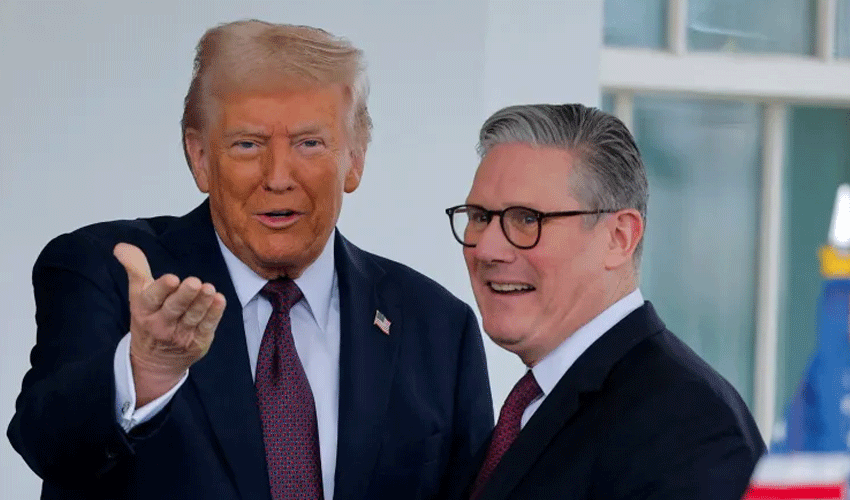The United Kingdom and the United States on Thursday announced a new trade agreement that will see a partial rollback of tariffs imposed by President Donald Trump since his return to the White House earlier this year, offering some relief to several key British industries.
Under the arrangement, the US will reduce the contentious 25 percent import tax on British-made cars to 10 percent for up to 100,000 vehicles annually.
The agreement also includes revised quotas for tariff-free UK steel and aluminum exports to the US and allows for expanded agricultural trade between the two allies.
No formal treaty was signed, and both governments provided only limited details. However, British Prime Minister Sir Keir Starmer hailed the move as a “fantastic platform” for future cooperation.
Speaking at a Jaguar Land Rover facility in the West Midlands, Starmer stated that the deal protects “thousands of British jobs in key sectors including car manufacturing and steel,” adding that the UK has “no greater ally than the United States.”
In Washington, President Trump characterized the accord as a “great deal,” defending it against criticism that it falls short of meaningful change. “This is a maxed-out deal that we’re going to make bigger,” he asserted.
Limited Tariff Relief
The US had increased car tariffs to 25 percent last month — a move that risked severely impacting British luxury carmakers such as Jaguar Land Rover and Rolls Royce.
The new agreement lowers that tariff to 10 percent but imposes an annual cap of 100,000 vehicles — roughly equivalent to the UK’s current export volume to the US, thus limiting potential future growth.
British Business Secretary Jonathan Reynolds indicated that the UK had narrowly avoided significant job losses. “This was very serious,” he told the BBC. “It would have meant people would have lost their jobs without this breakthrough.”
Tariffs on steel and aluminum, which were also raised to 25 percent earlier this year, will now be managed under quotas, reinstating a system similar to the one in place before Trump’s latest tariff hikes.
In agriculture, the two countries agreed to allow the tariff-free import of up to 13,000 metric tonnes of beef annually — a notable increase from previous limits. The US Trade Representative’s office stated that this would significantly boost US beef sales to the UK, which had previously faced a 20 percent tariff and a cap of just 1,000 tonnes.
According to the US, these changes will unlock a $5 billion opportunity for American exports, including $700 million in ethanol and $250 million in other agricultural goods.
US Agriculture Secretary Brooke Rollins hailed the deal as “a major milestone for US farmers and ranchers.”
Mixed Reactions
While the agreement was praised by UK Steel Director General Gareth Stace, who described it as “major relief” for the sector, business leaders offered more reserved reactions.
“It’s better than yesterday but definitely not better than five weeks ago,” commented Duncan Edwards, chief executive of BritishAmerican Business, referring to the pre-tariff trade environment. “I’m trying to be excited, but I’m struggling a bit.”
Political reaction in Westminster was similarly divided. Conservative leader Kemi Badenoch criticized the agreement as one-sided, arguing that it left UK industries more vulnerable.
“This is not a historic deal with the US,” she stated. “We’ve been shafted.”
Liberal Democrat leader Sir Ed Davey called for a parliamentary vote on the deal, warning that “the devil will be in the detail” — particularly with Trump in power in Washington. “Trump’s trade tariffs are still hitting key British industries, threatening livelihoods across the UK,” he added.
Nigel Farage, leader of Reform UK, welcomed the announcement as a “step in the right direction” and called it a “Brexit benefit.” “The important point is that we are doing stuff, we are making a move,” he told the BBC.
Unresolved Issues
The deal does not appear to have resolved long-standing disagreements regarding pharmaceutical trade or food standards. The US has previously advocated for broader market access for American-made drugs and changes to UK food safety regulations — both politically sensitive issues.
The UK government stated that there would be no weakening of food safety standards and noted that British firms would receive “preferential treatment” in future pharmaceutical procurements. However, Ewan Townsend, a trade lawyer at Arnold & Porter, suggested that the healthcare industry was “still waiting to see exactly what this preferential treatment will mean.”
Michael Pearce, deputy chief economist at Oxford Economics, suggested that the agreement was unlikely to have a significant economic impact. “We’re not making any changes to our forecasts as a result of this announcement,” he said.
Trade talks between the two countries had previously stalled during Trump’s first term over similar sticking points. Analysts remain cautious, noting that while Thursday’s announcement may offer some political respite, it is unlikely to represent a substantial shift in bilateral trade relations.
“The broader issues haven’t gone away,” Pearce concluded. “This is more of a tactical pause than a strategic reset.”



